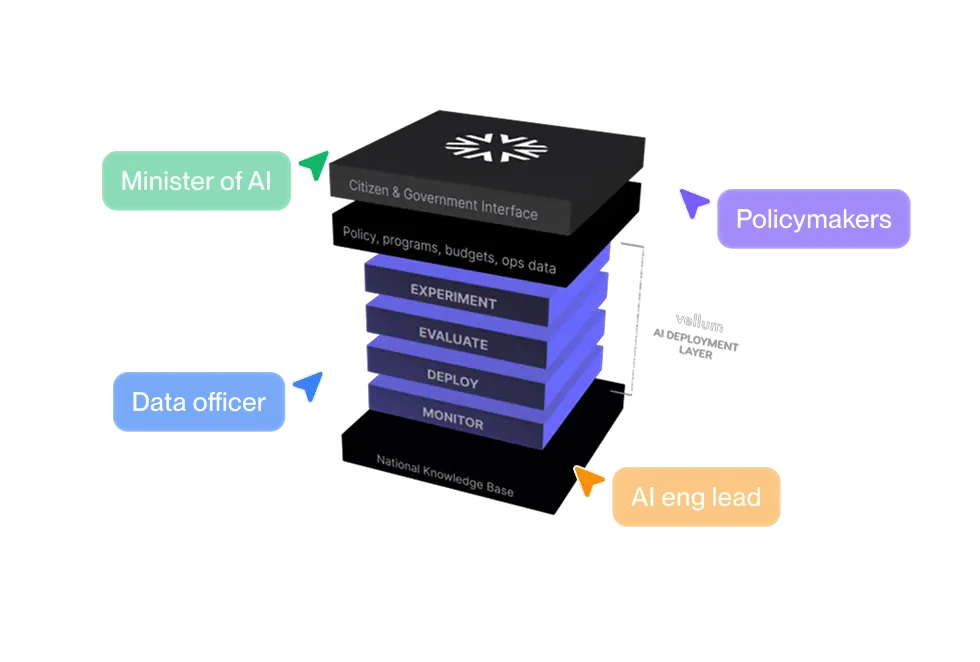Sovereign AI for government transformation


.avif)






.avif)




















Defines claims processing logic, fraud detection criteria, and business rules through Vellum's visual interface. Can approve pilots up to $75K; requires CFO approval for large initiatives. Must demonstrate ROI in 24 months and maintain regulatory compliance.
Builds production infrastructure, integrations, and ensures enterprise-grade reliability and compliance. Can architect solutions but requires InfoSec, Compliance, and MRM sign-off. Must maintain 99.9% uptime and complete audit trail compliance.




Designs intake logic and ensures clinical safety. Defines escalation paths (emergency vs non-emergency) and validates AI prototypes against compliance standards. Requires ongoing consultation with hospital ethics committee and medical staff leadership.
Builds integrations into EMR systems and ensures secure data handling. Implements production-grade infrastructure for patient data. Must maintain audit logging, uptime, and strict regulatory compliance (HIPAA, SOC-2).




Oversees sourcing strategy and supplier stability. Approves solutions up to $250K with council review and sets standards for risk detection updates. Must balance early warning adoption and maintaining supplier relationships.
Architects AI solutions with 10+ years in enterprise systems and 4+ years in supply chain. Designs workflows within SAP while ensuring audit compliance. Requires approvals from InfoSec, Legal, and Compliance before deployment.
Executive sponsor with quarterly board reporting
Final validation on risk methodology and escalation
Data governance and system integration approval
Regulatory requirements and supplier communication protocols
Domain expert who lived through Zentech crisis.




Primary business champion with 15+ years pricing expertise. Defines pricing logic and competitive response rules through Vellum's visual interface.
Technical architect building production infrastructure and integrations. Ensures enterprise-grade reliability and compliance.




Appointed to coordinate national AI policy, innovation, and oversight. Establishes standards, manages risks, and ensures AI adoption aligns with sovereign priorities.
Holds statutory responsibility for information systems and digital infrastructure. Ensures AI is securely integrated, interoperable across agencies, and resilient against cyber and operational risks.
Conservatively scoped, compliance-ready pilot with MRM validation, CRO risk controls, secure system integration, and full audit documentation.
6,200 claims processed with $89K annual savings, reflecting a 14% cost improvement. Error rate steady at 2.3% and customer satisfaction sustained at 71%.
Multi-state AI claims system delivering faster processing, higher fraud detection, and $285K annual savings in Texas, while adapting workflows and integrations for Florida expansion.
Market-leading claims AI program that delivers faster processing, higher fraud accuracy, lower costs, and industry recognition.
Compliance-ready pilot with MRM validation, CRO risk controls, HIPAA-secure integration, and full audit documentation. Implementation included 6-month physician training program, ongoing clinical advisory board oversight, and quarterly compliance audits with healthcare legal counsel.
8,500 patient intakes processed with human oversight for 30% of complex cases, achieving $95K annual savings primarily through administrative efficiency gains rather than clinical workflow changes.
Multi-state AI chatbot delivering faster intake, higher accuracy, and $310K annual savings in California, while adapting workflows and integrations for Florida rollout.
Market-leading AI medical chatbot program delivering faster patient intake, higher accuracy, lower costs, and recognized as an industry benchmark.
Compliance-ready pilot with CRO-defined risk controls, InfoSec-secure SAP integration, and full audit documentation. Implementation included 12 months of parallel human validation, governance and data quality frameworks, and quarterly reviews with legal and compliance leadership.
By month 16, supplier assessment time dropped from 38 hours to 18–22 hours (42–53% improvement), with detection accuracy ranging 68–74% and a 12% false positive rate under manual review. The pilot covered eight suppliers, documented one case of disruption prevention, and maintained supplier satisfaction through enhanced communication protocols despite initial concerns.
Processing time improved from 18 to 12 hours per assessment (33% gain), with risk detection accuracy reaching 73–78% and false positives stabilizing at 10–14% after adjustments for supplier relationship sensitivity.
After 48 months, the organization builds institutional intelligence from accumulated supplier data, develops advanced business logic on Vellum’s platform, adapts risk models in weeks instead of months, and gains credibility through responsible AI use in supplier management.
Executive backing secured with $800K budget, pilot categories defined, ERP and governance requirements scoped, and organization prepared with training, team alignment, and risk workflows.
: Production-ready AI pricing system with validated business logic and enterprise controls, processing 1,000+ pricing decisions monthly.
Organizational learning velocity exceeding individual expertise - 6 categories with sustained 2.1-2.8% margin improvements.
Market-leading pricing capabilities with $8-12M annual value through margin optimization and competitive intelligence advantages that competitors cannot replicate through technology purchase alone.
Cut average AI project rollout from 24–36 months to under 6 months, enabling faster delivery of citizen services.
Reduce foreign vendor reliance by 40–60%, keeping sensitive data on national infrastructure.
Achieve 100% audit trail coverage for all AI decisions, with explainability reports available to oversight bodies.
Deliver measurable ROI such as 2–4× efficiency gains in core processes (procurement, healthcare claims, licensing), translating into billions in annual savings and GDP growth contributions.



.webp)
.avif)

Vellum has achieved HIPAA compliance and maintains capability for secure handling of PHI. We also have SOC 2 Type 1 and Type 2 attestations. Our platform includes built-in audit trails, traceability, and security architecture that support regulatory exams and legal compliance reviews.
We support healthcare organizations with built-in tools for governance and model risk management. Vellum supports evaluation frameworks that test and measure model accuracy, reliability, latency, and cost before deployment. We also support bias testing and compliance documentation to meet model risk management standards. By separating environments for development, testing, and production, Vellum supports safer updates and minimizes the chance of errors in live systems.
We support integration by structuring data outputs so they can flow directly into EHRs and other systems. Vellum supports use cases like chart summarization, prior authorization, and insurance eligibility verification, all of which require working with external systems. We support verification steps like cross-checking provider availability or insurance coverage before automating tasks, which ensures that clinical and administrative workflows stay accurate and compliant.
We support collaboration across roles so that healthcare teams aren’t limited to engineers. Vellum supports a low-code builder alongside an SDK, making it possible for clinicians, product managers, and compliance leads to participate in building or refining AI workflows. We support same-day improvements by allowing non-engineers to make changes safely, while engineers maintain control of the underlying code when deeper customization is needed.
We support safe deployment by giving teams ways to test, validate, and monitor AI outputs. Vellum supports performance thresholds and evaluation frameworks so you can measure accuracy and reliability before going live. We support human escalation paths, ensuring that high-risk or ambiguous cases can be routed to clinicians instead of relying fully on AI. After deployment, Vellum supports ongoing monitoring and traceability, so if an edge case occurs, your team can replay and analyze exactly what happened.
We support measurable ROI by reducing the time it takes to go from idea to production. Vellum supports faster AI delivery—customer stories show improvements of up to 40%—and makes it easier for non-engineers to implement same-day updates. We support administrative cost reduction through workflows like patient intake, prior authorization, and ambient scribing that remove repetitive manual steps. We also support compliance teams by cutting down the effort needed to prepare security and regulatory documentation.
We support teams in starting small and scaling safely. Vellum supports pilot use cases like patient intake or clinical summarization that allow you to prove value without taking on high clinical risk right away. We support cross-functional collaboration by giving clinicians, engineers, and compliance leads shared tools to define success criteria and test workflows. We support rapid iteration in a safe environment, so once a pilot succeeds, you can expand into more complex workflows and additional departments.
We support VPC deployment so your data never leaves your own cloud, giving you hospital-grade control without building the system yourself. Vellum supports HIPAA and SOC 2 compliance, encryption, and audit trails out of the box, helping clinicians trust that patient data is protected. We support faster rollout with templates and a simple UI, so clinical teams can test and refine workflows directly with engineers. This means safer adoption, quicker feedback, and less time lost to paperwork or manual charting.
Yes. We support two deployment models. SaaS for a fast start, and VPC for full data-plane isolation inside your AWS, GCP, or Azure account. In the VPC setup, all routing and processing of PHI stays inside your network, with private endpoints to model providers, bring-your-own keys, and strict access controls. We support your logging, monitoring, IAM, and change-management processes so security, compliance, and IT teams keep the same guardrails they already use for other clinical systems—while product teams can still ship AI features faster.